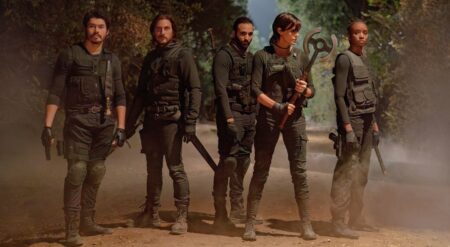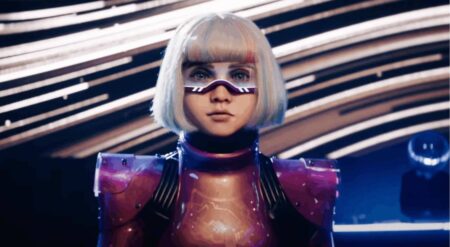
A coy smile. A curious glance. Lit cigarettes to round further building inquiries and affirm suspicions (or just because). What exactly is truth and what isn’t? Netflix Original, God’s Crooked Lines is a Spanish psychological thriller mystery directed by Oriol Paulo and written by Paulo, Guillem Clua, and Lara Sendim; an adaptation of the 1979 novel “Los renglones torcidos de Dios” by Torcuato Luca de Tena.
First peering onto a slow aerial sweep of lush evergreen mountain pines, we quickly ground ourselves through a paved road path in a red Mustang alongside our protagonist Alice Gould (Bárbara Lennie) and her driver heading towards our primary setting in the film, Our Lady the Fountain Hospital. Alice is a private investigator hired to solve a homicide that takes place at a psychiatric hospital which she voluntarily admits herself to, posing paranoia as her diagnosis to gain access.
Out the gate, the story and plot is not an unfamiliar one and does not add nuance to the genre. Alice begins to question her sanity while undercover in the asylum, undergoing practices and perspectives concerning mental health in 1979. It didn’t take long to surmise the plot. In that regard, the film fell short for me. However, it carried itself in how it chose to cinematically display the mounting questions of sanity for Alice. The true driving force of the film. The plot acting as the base; the focus is how we question (or arrive at) reality and truths. For this, I was able to push through to the end of its two hour and thirty-four minutes runtime.
The film blends two timelines: the present, where Alice is trying to unearth the murderer, and the past events leading up to the homicide. This approach moves the story as you piece the case along with Alice while composing your own questions. The use of some easily overlooked audio tracking to signal the mental space of Alice in tandem to a shift in cinematic style helps build the mystery and confusion felt by all parties.
Much of what is happening is from Alice’s point of view where actress Bárbara Lennie carries it throughout the film well. Dancing between private investigator and patient in question at the hospital. Her co-stars Loreto Mauleón (Montserrat Castell), Javier Beltrán (Dr. Cesar Arellano), and Eduardo Fernández (Samuel Alvar) act as the main reoccurring operators in determining the state of all the patients residing at the hospital. While the character building for these members are a bit lacking, their screen time work towards the focus of the film. The three physicians also do well in portraying the differing emotions and thoughts centered around psychiatric in the late 1970s conveyed towards Alice.
The ending of the film was simultaneously satisfying and not. It left me perplexed and in a slight spin where I found myself almost compelled to watch a second time. (I didn’t.) Wanting to retrace the moments when I felt or thought a particular way. This execution evokes conversation and leaves the viewer to their own conclusion. God’s Crooked Lines is a film of continual mystery right from the very beginning. What you think you know is always up for question.
A combination of runtime and what felt like rushed character motivations to progress the plot is what holds back this film. Shaving off several minutes could arguably still deliver the same outcome. I found myself beginning to feel like Alice; held up at the psychiatric hospital for longer than I needed to be and I wanted out. Maybe that is part of the intention though, for the viewer to feel that mental strain.
God’s Crooked Lines is available for streaming exclusively on Netflix.
God's Crooked Lines
-
Rating - 6.5/106.5/10
TL:DR
A combination of runtime and what felt like rushed character motivations to progress the plot is what holds back this film. Shaving off several minutes could arguably still deliver the same outcome. I found myself beginning to feel like Alice; held up at the psychiatric hospital for longer than I needed to be, and I wanted out. Maybe that is part of the intention for the viewer to feel that mental strain.






